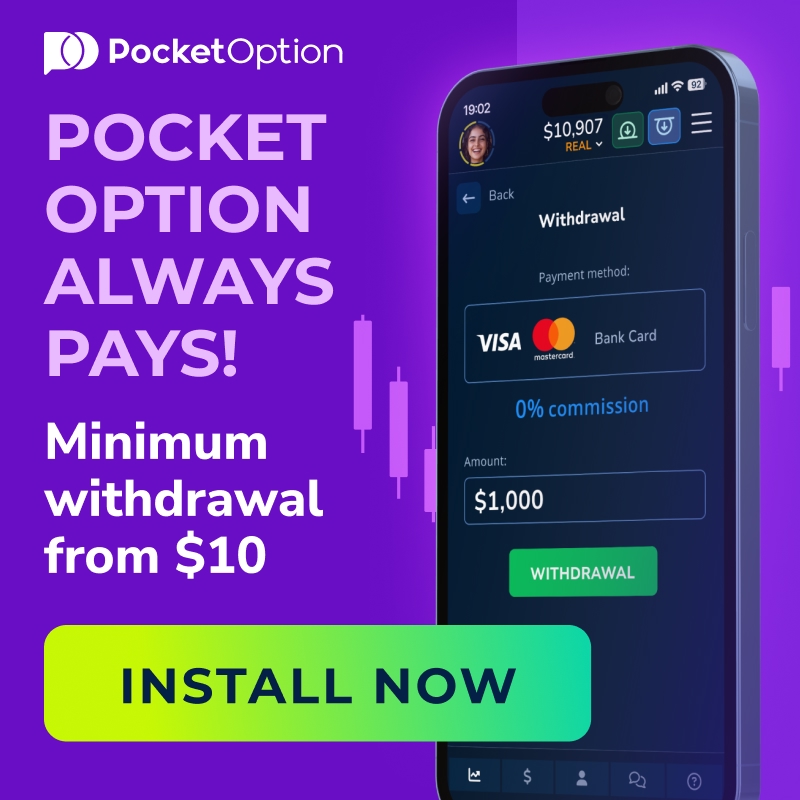
15 minute read
Is Pocket Option Regulated in Nigeria? Review Broker
Introduction to Online Trading Platforms
Overview of Online Trading
Online trading has gained significant popularity over the past few decades, especially with the rise of internet connectivity and technological advancements. The ability to trade from anywhere in the world has revolutionized the financial markets, enabling individuals to invest in a variety of assets, including stocks, forex, commodities, and cryptocurrencies. This convenience and accessibility have attracted millions of traders globally, and Nigeria is no exception.

💥 Trade with Pocket Option now: Open An Account or Visit Brokers 👈
In Nigeria, online trading is becoming increasingly popular, particularly in the forex and binary options markets. The variety of platforms available has made it easier for traders to enter the market, but it has also raised questions about the security and legitimacy of these platforms. With the absence of a centralized financial exchange in Nigeria, traders need to be cautious when selecting brokers and platforms for trading.
Importance of Regulation in Trading
The importance of regulation in the trading industry cannot be overstated. Regulatory bodies ensure that trading platforms operate transparently and adhere to the highest standards of conduct. Regulation provides a layer of protection for traders, ensuring that their funds are kept safe, their interests are safeguarded, and they have legal recourse if issues arise.
For traders in Nigeria, understanding the regulatory framework is critical when selecting a trading platform. A regulated broker is required to follow strict rules regarding transparency, customer fund protection, and financial reporting, which reduces the risks associated with online trading. Without regulation, traders are at a higher risk of fraud, market manipulation, and the possibility of being unable to recover their funds in the event of issues with the broker.
Understanding Pocket Option
Company Background and History
Pocket Option is a binary options trading platform that was established in 2017. It quickly became popular due to its user-friendly interface, low deposit requirements, and access to a wide range of financial instruments. The platform allows traders to trade binary options on various assets, including forex, stocks, cryptocurrencies, and commodities. Since its inception, Pocket Option has attracted traders from various regions, including Africa, Europe, and Asia.
The broker’s platform provides a simple way for traders to invest in financial markets by predicting the price movements of assets within a set time frame. Although it has gained popularity, Pocket Option is often criticized for its lack of regulation, which raises questions about its trustworthiness and reliability as a broker.
Types of Financial Instruments Offered
Pocket Option offers a wide variety of financial instruments for trading. These include:
Forex: Currency pairs are among the most popular trading instruments on Pocket Option. Traders can speculate on the price movements of major, minor, and exotic currency pairs.
Cryptocurrencies: With the rise of digital currencies, Pocket Option also offers cryptocurrency trading, including popular coins like Bitcoin, Ethereum, and Litecoin.
Stocks: Traders can access a range of global stocks, including those from major indices such as the S&P 500 and NASDAQ.
Commodities: Pocket Option provides access to commodities like gold, oil, and silver.
Indices: Traders can also speculate on global stock indices like the Dow Jones Industrial Average and the FTSE 100.
Despite the wide range of trading options, the lack of regulation is a significant concern for Nigerian traders.
Regulatory Environment in Nigeria
Key Regulatory Bodies in Nigeria
In Nigeria, the regulation of the financial markets, including online trading platforms, falls under the jurisdiction of several key bodies:
The Securities and Exchange Commission (SEC) Nigeria: The SEC is the primary regulatory authority overseeing securities markets in Nigeria. It regulates and supervises brokers and firms involved in securities trading, including the stock exchange and related activities.
Central Bank of Nigeria (CBN): The CBN is responsible for regulating the banking system and foreign exchange activities in Nigeria. While it does not regulate online trading platforms directly, its policies influence the operations of financial institutions that may partner with brokers for payment processing.
The Nigerian Stock Exchange (NSE): While the NSE primarily regulates the Nigerian stock market, its rules and guidelines also affect brokers who facilitate securities trading in the country.
National Pension Commission (PenCom): Although PenCom is mainly concerned with pension fund management, its role in overseeing financial products and ensuring that all financial transactions are conducted according to the law also extends to some aspects of trading platforms.
Overview of Compliance Standards
To legally operate within Nigeria, brokers offering trading services must comply with the regulatory standards set forth by the SEC and other relevant bodies. The SEC ensures that brokers are licensed, meet certain financial and operational requirements, and protect the interests of investors. Additionally, platforms that offer forex or binary options trading must ensure they comply with specific laws and regulations related to trading activities, such as anti-money laundering (AML) measures, know-your-customer (KYC) requirements, and data protection laws.
In contrast, Pocket Option does not appear to be registered with the SEC or any of the regulatory bodies that oversee trading platforms in Nigeria. As a result, traders using Pocket Option in Nigeria may not have the same level of legal protection as those who use regulated brokers.
Is Pocket Option Regulated in Nigeria?
Current Status of Pocket Option’s Regulation
At the time of writing, Pocket Option is not regulated by any official regulatory body in Nigeria. The broker is registered in Seychelles, and it operates under the oversight of the FinaCom (Financial Commission), which is not a government regulatory authority but an independent organization offering dispute resolution for financial services. While FinaCom offers some protection for traders, it is not as stringent or reliable as government-backed regulators like the SEC in Nigeria.

💥 Trade with Pocket Option now: Open An Account or Visit Brokers 👈
Since Pocket Option is not licensed or regulated by Nigerian authorities, it means that the platform does not adhere to local financial laws, which could lead to potential risks for traders in Nigeria. The lack of regulation raises concerns about the transparency and security of the platform, particularly in the event of disputes or issues with withdrawals.
Comparison with Other Trading Platforms
When compared to other brokers operating in Nigeria, Pocket Option falls short in terms of regulatory oversight. Many well-established brokers that cater to Nigerian traders, such as FXPesa or Exness, are regulated by reputable authorities such as the UK’s Financial Conduct Authority (FCA) or CySEC in Cyprus. These brokers offer enhanced investor protection, transparency, and legal recourse in the event of disputes.
On the other hand, platforms that are not regulated in Nigeria, like Pocket Option, may not offer the same level of safety and investor protection. Unregulated brokers can operate with fewer restrictions and could potentially engage in unethical practices, such as price manipulation or withdrawal delays, with little to no recourse for traders.
The Importance of Regulation for Traders
Impact on Investor Protection
Regulation is crucial for ensuring that traders' funds are protected and that brokers adhere to ethical standards. A regulated broker is required to segregate client funds from their operating capital, reducing the risk of fund misappropriation. In the event of a dispute or insolvency, traders may also have access to compensation schemes or insurance that protect their investments.
For Nigerian traders, using a regulated broker provides confidence that their funds will be safeguarded and that they have legal recourse if issues arise. Without regulation, traders are exposed to higher risks, including the possibility of fraud, mismanagement of funds, and the inability to recover lost money.
Effects on Trading Practices
Regulated brokers are subject to strict rules that govern their trading practices, ensuring that they operate fairly and transparently. This includes requirements for proper reporting, transparency in pricing, and fair execution of trades. In contrast, unregulated brokers may not be subject to such rules, which can result in manipulative practices, such as slippage, price manipulation, and unfair spreads.
For Nigerian traders, choosing a regulated broker ensures that they are participating in a fair and transparent market where their trades are executed accurately and without manipulation.
Risks Associated with Unregulated Brokers
Potential for Fraud
Unregulated brokers, such as Pocket Option, pose a significant risk of fraud. Without oversight from financial regulators, these brokers can operate without fear of legal consequences, potentially engaging in fraudulent activities. This includes activities such as non-payment of withdrawals, manipulation of pricing, and misleading marketing practices.
Traders on unregulated platforms may have limited recourse if they fall victim to fraud or malpractice. In contrast, regulated brokers are required to adhere to strict rules designed to protect traders and ensure that their operations are legitimate.
Lack of Accountability and Transparency
Without regulation, unregulated brokers like Pocket Option may lack transparency in their operations. For example, they may not disclose how they handle client funds, their pricing models, or their fee structures. This lack of transparency can leave traders in the dark about how their trades are being executed, leading to potential confusion and distrust.
Furthermore, unregulated brokers may not be subject to regular audits or inspections, which means that their financial stability and operational integrity cannot be independently verified. This lack of accountability increases the risk for traders and undermines the trustworthiness of the platform.
How to Verify the Regulation of a Broker
Steps to Check Broker's Regulatory Status
Before opening an account with any broker, it is essential to verify their regulatory status. Traders can follow these steps:
Check the Broker’s Website: Legitimate brokers often display their regulatory license information on their website. Look for the name of the regulatory body and the license number.
Visit Regulatory Websites: Traders can visit the official websites of regulatory bodies like the SEC Nigeria, the FCA (Financial Conduct Authority), or CySEC (Cyprus Securities and Exchange Commission) to verify whether the broker is licensed in a reputable jurisdiction.
Search for Reviews and Feedback: Online reviews and trading communities often provide valuable insights into the regulatory status of a broker. Look for discussions about the broker’s regulatory status and experiences from other traders.
Contact Customer Support: Traders can directly contact the broker’s customer support team to ask for information about their regulation. A reliable broker will provide this information promptly.

💥 Trade with Pocket Option now: Open An Account or Visit Brokers 👈
Resources for Regulatory Information
SEC Nigeria: Visit the official website of the Securities and Exchange Commission to verify whether a broker is registered and licensed in Nigeria.
FCA (UK): The UK’s Financial Conduct Authority provides a register of licensed brokers and firms operating in the financial markets.
CySEC: CySEC is another trusted regulatory body that oversees brokers in Europe, including those offering services to Nigerian traders.
User Experiences with Pocket Option
Positive Feedback from Traders
Despite concerns about its regulation, some traders have reported positive experiences with Pocket Option. Traders often praise the platform for its user-friendly interface, low minimum deposit requirement, and the ability to trade a wide range of financial instruments. Many users appreciate the variety of educational materials and demo accounts available, which help beginners learn and practice before committing real funds.
Common Complaints and Issues
However, there are also several complaints from users regarding Pocket Option. The most significant issue is the lack of regulation, which creates a sense of uncertainty among traders. Some traders have reported issues with delayed withdrawals and unresponsive customer support. Additionally, the platform’s high fees and inconsistent pricing have been cited as points of frustration by some users.
Alternatives to Pocket Option
Regulated Trading Platforms in Nigeria
For Nigerian traders seeking safer, regulated options to Pocket Option, there are several reputable brokers offering access to financial markets while adhering to industry standards. These platforms are registered with recognized financial authorities, providing transparency, security, and customer protection, which are crucial in today’s trading environment.
FXPesaFXPesa is a highly regarded online broker in Nigeria that is licensed and regulated by the Capital Markets Authority (CMA) of Kenya and offers access to a wide range of assets, including forex, stocks, indices, and commodities. FXPesa provides users with competitive spreads, robust trading platforms, and a solid customer service structure. It is an ideal option for Nigerian traders looking for a regulated alternative to unregulated platforms like Pocket Option.
ExnessExness is a global brokerage that operates under various international licenses, including those from the Financial Conduct Authority (FCA) in the UK and the Cyprus Securities and Exchange Commission (CySEC). Exness offers comprehensive services with low spreads, a variety of account types, and reliable deposit and withdrawal methods. It is one of the most respected brokers worldwide, offering transparency and security to Nigerian traders.
IQ OptionIQ Option, a well-established broker, is regulated in various countries, including Cyprus under CySEC. It offers a range of trading products, including stocks, forex, cryptocurrencies, and binary options. IQ Option’s platform is user-friendly and provides useful features such as advanced charting tools and a demo account to practice before committing real money.
HotForexHotForex is another regulated broker with a strong presence in Nigeria. Licensed by the Financial Services Commission (FSC) of Mauritius, it is well-regulated and offers a wide range of trading instruments, including forex, commodities, indices, and cryptocurrencies. The broker provides a variety of account types tailored to both beginner and advanced traders and ensures that funds are segregated and protected.
OctaFXOctaFX is a popular choice for traders in Nigeria due to its robust regulatory framework and reliable services. The broker is licensed in multiple jurisdictions, including CySEC, and it offers competitive spreads, leverage options, and access to multiple financial markets. OctaFX’s transparency, solid customer service, and user-friendly trading platforms make it a safe and regulated alternative to Pocket Option.
Choosing the Right Trading Platform
When choosing a trading platform, Nigerian traders should consider several key factors to ensure that they select a secure and reliable broker. Here are some crucial considerations:
Regulation: Always prioritize brokers that are licensed and regulated by reputable authorities, such as the Financial Conduct Authority (FCA), CySEC, or local bodies like the Capital Markets Authority (CMA). This ensures that the broker follows strict rules regarding client protection, fund segregation, and dispute resolution.
Trading Instruments: Look for a broker that offers a wide variety of financial instruments, including forex, stocks, commodities, and cryptocurrencies, to allow you to diversify your portfolio.
User-Friendly Platform: The broker’s trading platform should be easy to navigate, with intuitive design and features such as real-time charting, technical analysis tools, and fast execution speeds. Popular platforms such as MetaTrader 4 (MT4) and MetaTrader 5 (MT5) are known for their reliability and advanced features.
Customer Support: Excellent customer service is essential when choosing a broker. Ensure that the platform offers 24/7 support through multiple channels like live chat, phone, and email. A responsive customer service team can help resolve any issues promptly and ensure smooth trading experiences.
Fees and Commissions: Compare the fees and commissions charged by different brokers, including spreads, inactivity fees, and withdrawal fees. A good broker should offer competitive pricing while maintaining transparency in their fee structure.
Educational Resources: For new traders, access to educational resources like tutorials, webinars, and demo accounts is invaluable. Choose brokers that offer comprehensive learning tools to help you build your trading skills before risking real capital.
Withdrawal and Deposit Methods: Ensure that the broker offers multiple convenient and secure payment methods for deposits and withdrawals, such as bank transfers, credit cards, and e-wallets. Additionally, verify the withdrawal processing times and ensure they align with your expectations.
Why Regulated Brokers Are Safer
Regulated brokers offer several advantages over unregulated platforms like Pocket Option:
Investor Protection: Regulated brokers are required to follow strict guidelines for the protection of traders' funds. This typically includes segregating client funds from the broker’s operating capital, ensuring that even in the event of insolvency, client funds remain safe.
Transparency: Regulated brokers must provide clear and accurate information regarding their operations, pricing, and fees. They are also required to submit regular financial reports and undergo audits to ensure compliance with the law.
Dispute Resolution: If traders encounter issues with regulated brokers, they have access to well-established dispute resolution mechanisms, including compensation schemes and legal recourse through the regulatory body.
Fair Trading Practices: Regulated brokers must adhere to strict rules governing their trading practices, ensuring fair execution, accurate pricing, and transparent operations. This reduces the likelihood of issues like price manipulation and slippage, which can occur on unregulated platforms.
Security and Risk Management: A regulated broker will implement strong security measures to protect your personal and financial data. These brokers also provide risk management tools to help traders manage their trades effectively.
Conclusion
While Pocket Option offers a user-friendly platform with a range of financial instruments, its lack of regulation raises significant concerns for Nigerian traders. Without the oversight of reputable regulatory authorities, traders may face risks such as fraud, untransparent practices, and difficulty in recovering funds.
For traders in Nigeria, selecting a regulated broker ensures a higher level of security, transparency, and protection. Brokers like FXPesa, Exness, IQ Option, HotForex, and OctaFX provide regulated trading environments that safeguard investor interests and ensure that trades are executed fairly.
When choosing a trading platform, Nigerian traders should prioritize regulation, transparency, and strong customer support to ensure a safe and successful trading experience. Regulated brokers offer the best protection against the risks that unregulated brokers like Pocket Option pose, giving traders peace of mind while they navigate the financial markets.
Read more:



